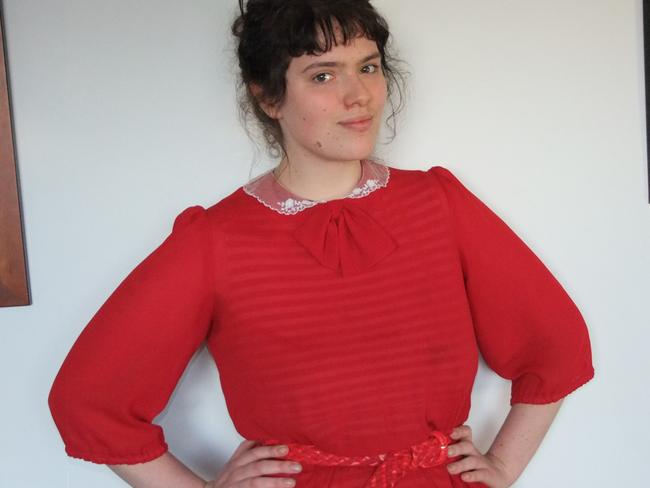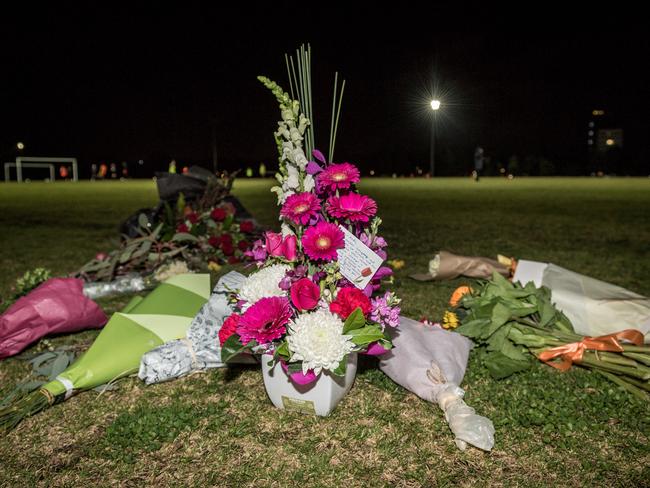Everyday steps women take that would shock men
WOMEN are so used to the idea they might get raped, they’re constantly preparing themselves. That’s not OK.

OPINION
IMAGINE if every time a school shooting happened, police advised all parents to homeschool their children instead?
Or if after the Martin Place massacre, police advised all workers to work from home offices and avoid cafes?
In such cases, authorities implicitly understand that these responses would be deeply unhelpful and not an effective solution.
Yet almost every single time a woman is raped and murdered the police response is to tell women — not perpetrators — to modify their behaviour.
Yesterday, it was confirmed that Eurydice Dixon, a 22-year-old comedian from Melbourne had been murdered in Princess Park, Carlton.
Police had been quick to tell the public (and let’s be clear here, by that, I mean women) to “make sure that you have situational awareness, that you’re aware of your surroundings, and make sure that people know where you are”.
“If you’ve got a mobile phone, carry it, and if you’ve got any concerns call police.”
Only here’s the thing. Like almost all women, Eurydice Dixon was aware of her surroundings. She did carry a mobile phone. And when she had concerns she used it.

It’s now been revealed that just a few hundred meters from home, Dixon had sent a text to a friend saying “I’m almost home safe, HBU (how about you?)”
Telling women to have ‘situational awareness’ is deeply unhelpful because it assumes that women aren’t already constantly micromanaging their own safety in a bid to forward manage the poor behaviour of some men.
MORE: Tributes for Eurydice Dixon
MORE: Aussie women furious after the murder of Eurydice
Some years ago, I ran an exercise with young men and women. I asked the men to write on the whiteboard what they did every day to avoid being sexually harassed or assaulted.
Blank faces.
I then asked the women what they did every day to avoid being sexually harassed or assaulted.
Mad scribbling ensued.
“I cover my drinks at bars.”
“I sit in the backs of taxis”
“I walk the long way home because it’s better lit”
“I thread my keys between my fingers like Wolverine when walking through carparks”
“I sit with other women on trains”
“I try not to dress for attention”
And on and on it goes. Women are surprised to realise the extent to which they have internalised sexual threat as an omnipresent white noise in their life.

But it is men who are truly shocked: shocked by the extent to which women must constantly micromanage their own safety in public, shocked by the fear this speaks to, and shocked by just how differently women experience public space.
Which is precisely why it’s not helpful for male police officers to condescendingly remind women to have ‘situational awareness’.
And imagine if instead of telling women not to walk home alone or wear short skirts, police told men to exercise caution in how they get consent.
Imagine if instead of telling women to carry mace and not to speak to strangers, the public told the government to invest in men’s behavioural change programs and make consent education and respectful relationship education mandatory in schools.
In short, imagine if instead of putting the onus and responsibility back on women and victims, public service announcements and public messaging sought to engage would-be offenders.
Because the reality is that none of this advice is preventing sexual offenders from offending (and since it’s not actually aimed at them, we shouldn’t expect it to).
When we tell women not to wear short skirts we are also fundamentally misunderstanding the drivers and causes of sexual violence (it’s about power and control, not lust). But we’re also not really trying to prevent rape, rather we’re simply trying to reorder who gets raped, by downstreaming the problem to the next woman in line.

We’re saying, ‘Don’t rape me! Rape the drunker girl, the girl in the even shorter skirt.’
We’re also saying that we think male violence is not a choice that men have any control over.
And here’s the rub. Not only is this advice not making women safer, it’s actually enabling offenders, and putting women at greater risk.
How?
Well, when police tell women not to walk alone at night, it doesn’t stop women walking alone (and in reality, women are far more likely to be attacked in their own homes than on the streets).
What this advice does do is significantly deter women who have been assaulted from reporting to police for fear that they will be blamed or judged.
And this means that offenders can keep on offending with impunity.
I should know.
In the past I’ve spoken very publicly about my own experience of assault and it’s not something I shy away from.
At the time I reported it to police but, bruised and in pain, one officer told me “the problem is women just don’t understand the risky situations they put themselves in”.
Let that sink in.
A 23-year-old woman who has been bashed, choked, threatened with a box cutter and indecently sexually assaulted goes to police and is told “the problem is women”.
The impact of this is that I would find it much more difficult to report another crime to police in future.
Moreover, every single time the police issue these statements, they seem to forget that perpetrators don’t exist ‘out there’ in the ether.
They live among us. They are part of our community. They, too, exist in the media-reality feedback loop, and they hear the exact same messages on radio, on TV and in the news.
And you know what they hear?
They hear that these women are ‘asking for it’.
They hear that women who dress in certain ways, or walk in certain places are partly to blame.
And they also hear that they are a little bit less responsible if they choose to commit violence.
What’s also extraordinary is just how different our responses are to men being killed compared to women. When a young man is killed by a coward’s punch it can be enough to shutdown a city’s night-life.
When a woman is killed, perpetrators are expected to carry on, ‘business as usual’, but women are put on notice.
So instead of telling women to develop some ‘situational awareness’, perhaps it’s time we told police to develop some ‘situational awareness’.
And by that I mean perhaps it’s time they realised that rape is a situation for which the perpetrator is 100 per cent responsible, and that clumsily crafted messages aimed at women don’t make us safer, but do deter us from reporting.
Twitter: @NinaFunnell



